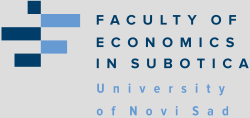THE AGE OF HRM 4.0 – IS DIGITALIZATION OF HRM REQUIRED FOR THE STRATEGIC HUMAN RESOURCE MANAGEMENT ORIENTATION?
DOI:
https://doi.org/10.46541/978-86-7233-416-6_1Abstract
Strategic human resource management orientation (SHRM), as the company’s philosophy of aligning human resource management (HRM) policies and practices with an organizational strategy for maximizing organizational results, is considered the highest level of the company’s HRM development according to the contemporary HRM theory. At the same time, one of the trends in HRM is the digitalization of HRM activities, following the global trend of adoption of digital tools for increasing individual and organizational efficiency and effectiveness, leading to the age of HRM 4.0. However, it is interesting to reveal whether is there a relationship between HRM digitalization and SHRM orientation. Consequently, we developed two research questions: (1) Are digital HRM practices positively related to the SHRM orientation? and (2) Are some digital HRM practices more relevant for the SHRM orientation than others?
For providing empirically based answers to research questions, we utilized the CRANET 2021 dataset, covering 4495 organizations with more than 200 employees from 38 countries worldwide. We used nine indicators revealing the existence of digital HRM (manager self-service, employee self-service, HRIS, algorithm-based HRM, HR analytics, telework, digital learning, social media recruitment, social media selection) and five indicators for determining the SHRM orientation (HR manager’s membership in the management board or equivalent; involvement of HR manager in the development of business strategy; existence of written HRM strategy; HR to employee ratio, the level of HR department performance evaluation) from the CRANET database. SHRM orientation was determined using K-Means cluster analysis, and relationships between variables were analysed using correlation and multiple logistic regression analysis.
The correlation analysis revealed that all indicators of digitalization of HRM processes have a positive and a significant relationship with SHRM orientation, implying that digital HRM practices are relevant for the SHRM orientation. The results of logistic regression indicated that the usage of manager self-service, algorithm-based HRM, HR analytics, telework, digital learning and social media selection increase the probability of organizations’ SHRM orientation more than other explored indicators. The HR analytics, digital learning and social media selection were identified as the most relevant digital HRM practices for an organization’s SHRM orientation.
Findings imply that HRM needs to pursue the global trend of digitalization to have the strategic leverage. To be on the optimal level of HRM development, organizations must not only employ their digital HRM assets to assure the maximum functionality for their internal customers, but keep the pace with technological advancements.



